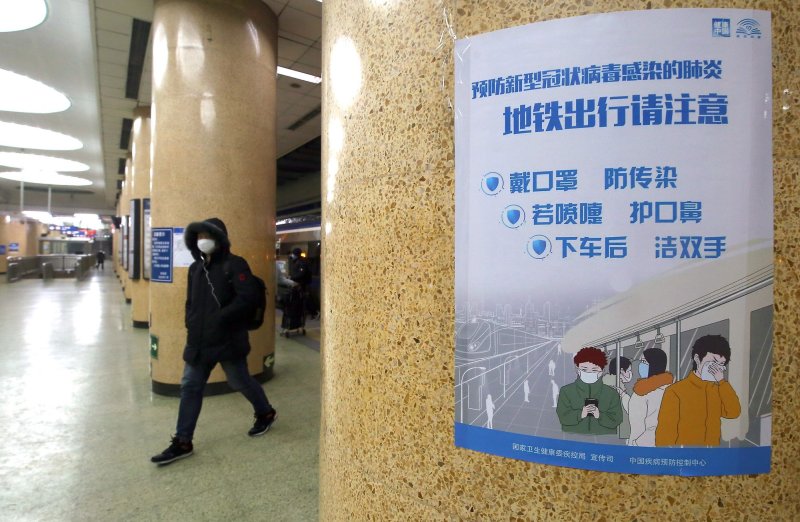1 of 3 | Public service announcements telling people to wear protective face masks are placed in a subway as the coronavirus continues to threaten Beijing on Thursday. Photo by Stephen Shaver/UPI |
License Photo
NEW YORK, Feb. 6 (UPI) -- The outbreak of the deadly coronavirus in Wuhan, China, may have shaken the Chinese people's faith in their government, but with public outrage mostly directed at local officials, China's central government could be consolidating power amid widespread fear.
Jennifer Huang Bouey, a senior policy researcher and Tang Chair in China Policy Studies at the RAND Corp. in Washington, says early mistakes are responsible for the outbreak of 2019-nCoV, which has infected more than 28,000 people worldwide and killed 565.
"There's a lot of anger," Bouey told UPI. "But there's also a lot of fear, anxieties about the epidemic."
"I think most people in China still think that the [government-imposed] quarantine is the only way to slow it down."
China's health ministry did not take comprehensive measures to contain the disease in Wuhan in December, when the first cases were reported at Huanan Seafood Market. By late January, the central government had placed entire cities under quarantine while rushing to build two new hospitals.
These and other "grand gestures" of a government under the control of the Chinese Communist Party could have restored a sense of safety among citizens, according to Bouey.
"They think this is the only way, the only security they have," she said.
China's completion of one of the two new Wuhan hospitals, built from temporary buildings and shipping containers, took place at lightning speed, just 10 days.
The facilities are being made available as other hospitals are reportedly overwhelmed with patients. Unverified images of dead bodies lying in the aisles of hospitals have circulated online since January. Press reports indicate people are lining up for hours to seek treatment or a diagnosis.
Kacie Miura, a research fellow at Harvard Kennedy School's Belfer Center for Science and International Affairs, said China's public health system is burdened in normal times.
"Even hospitals in China's most developed cities tend to be understaffed," Miura told UPI.
In building the new hospitals, the Chinese government could have had other objectives aside from treating sick patients. Authorities allow the construction to be viewed live online, creating a spectacle and an image of a government "in control of the situation and capable of accomplishing monumental tasks," Miura said.
The central government may appear to be in command, but critical oversight in the early stages of the outbreak contributed to the global epidemic.
Bouey said the closure of the Wuhan seafood market on Jan. 1 came after "pneumonia" cases began to be reported among the vendors -- 27 cases were reported on Dec. 30.
"They closed the seafood market, but that didn't trigger the national case reporting system," Bouey said, referring to China's multi-level bureaucratic system of verification.
Beijing's health ministry did send a team of experts on New Year's Day, producing some results. Chinese virologists were quickly able to first isolate the virus and learn the virus, likely from bats, can kill cultured human cells.
Experts also tried to play down the disease, however.
"This expert team was trying to assure the public that this is not a big deal, that there is only limited person-to-person transmission," Bouey said. "That turned out be wrong."
A more forceful response from the Chinese government, confirming the urgency of the situation and the dangers of human-to-human transmission did not come until after Jan. 13, when the World Health Organization reported the first case outside China, in Thailand.
Miura, who has been studying the latest developments, said it is obvious Wuhan officials knew about human-to-human transmission, but kept quiet.
"Rather than warn the public about the virus, local officials in Wuhan went about business as usual, continuing to host high-profile Chinese New Year events that put tens of thousands of people at risk," Miura said.
"There's a reason why local officials are prone to silencing whistle-blowers and covering up disasters like this one -- local officials are accountable not to the people, but to higher-level officials who are in charge of promoting them."
China's restless social media platforms, which helped to bring about Beijing's ultimate response to the outbreak, also remain heavily censored.
President Xi Jinping, meanwhile, has been mysteriously absent from the front lines of the battle against the coronavirus.
The crisis has been a "blow to public confidence" in the Communist Party, Miura said.
"Several county-level officials have already been removed from their posts," she said. "But whether scapegoating local officials will be enough to preserve the CCP's legitimacy is an open question.
"If it is not, we can expect even more repression, censorship, and propaganda."















